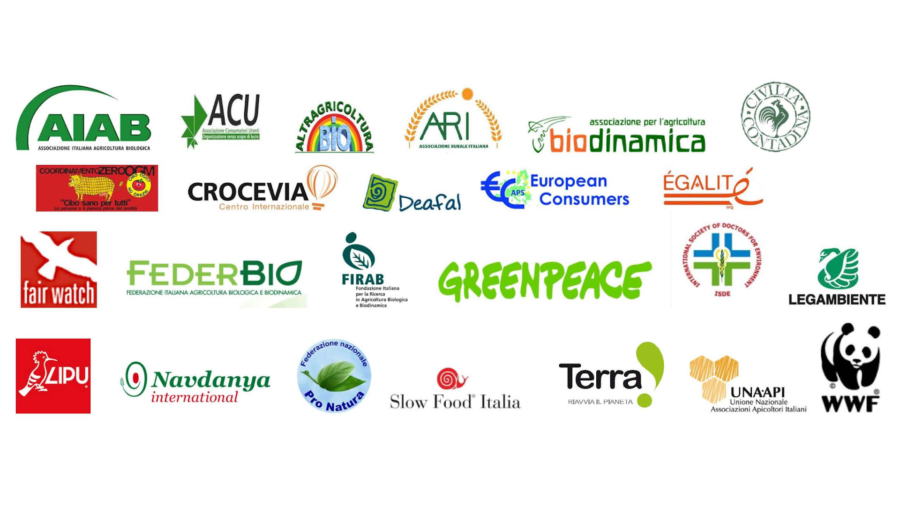
Rome, 05.05.2021: Organic and agroecological producers‘ associations as well as civil society organizations expressed their deep concern about the position adopted by the European Commission, expressing its support for an ad hoc regulation for novel techniques of genetic manipulation (NGT/NBT). This regulation would exempt them from the existing GMO legislation, thus circumventing the ruling of the European Court of Justice. This significant green light for the new generation of GMOs reveals the Commission’s surrender to the pressure exerted by the agribusiness industry, thus calling into question the European precautionary principle itself.
This is a severe threat to small and medium-scale local producers and, more generally speaking, to the whole organic and quality production sector that characterizes the Made in Italy brand. By echoing the voice of the industrial lobbies, the Commission is repeating the same pattern of unfulfilled promises that manifested 20 years ago in promotion of GMOs: less pesticides; higher yields; climate resilience.
The European Commission’s study on the novel genomic techniques known as NGT, or as NBT, was published at the Council’s request, and as a result of significant and continuous lobbying pressure from large industrial groups in the sector. The Commission, disregarding the risks and alarms raised by civil society and organic farmers‘ and peasants‘ organizations, issued its clearance to deregulation, with the new techniques currently falling under those GMO regulations established by the European Court of Justice in 2018. Removing the GMO products obtained through these techniques from the existing regulation also means calling into question the provision of clear labeling, the removal of which could deprive consumers of the right to know and choose what they are buying. Yet the European Union is very much the champion of traceability, currently capable of labelling many quality products.
We demand, confronted with this inauspicious breach, that European and national representatives, as well as officials of national, regional and local governments, mobilize immediately to prevent the undeclared introduction and cultivation of genetically modified organisms in Europe. A true ecological transition will be achieved by offering support to rural agriculture; promoting organic farming and favoring agroecology, the circular economy, and short supply chains, not by yielding to the pressures of multinationals and large agricultural corporations. It is precisely these corporations, in fact, that would gain control of the agri-food supply chain, making large profits from the commercialization of genetically modified varieties while continuing to impose the outdated production and distribution systems that have led to the current environmental crisis. Beyond this, extending patents on seeds represents a serious threat to communities food sovereignty.
The study will be discussed by EU ministers at the Agriculture and Fisheries Council in May. The Commission will also discuss its findings with the European Parliament and all stakeholders. In the coming months, an impact assessment, including a public consultation, will be conducted to explore policy options regarding regulation.
The contributing organizations: Acu, Aiab, Altragricoltura Bio, Apab, Ari, Civiltà Contadina, Coord. Zero GMO, Crocevia, Deafal, Egalité, European Consumers, Fairwatch, Federbio, Firab, Greenpeace, Isde, Legambiente, Lipu, Navdanya, Pro Natura, Slow Food, Terra!, Unaapi, WWF, demand the Commission to respect the precautionary principle, to protect the environment from any risk related to these new GMOs and to open a public debate based on facts and independent scientific data and unaffected by the interests of powerful industrial agriculture lobbies (more than 70% of the interviewees were preemptively in favour of NBT products). We demand the Italian Government to oppose the introduction of the new generation of GMOs and to safeguard the „GMO Free“ nature of its agriculture.
There is still time to stop this drift driven by large economic and financial interests in the sector, which have very little to do with environmental sustainability.
*Press release issued by: Acu; Aiab; Altragricoltura Bio; Apab; Ari, Civiltà Contadina, Coord. Zero GMO; Crocevia; Deafal; Egalité; European Consumers; Fairwatch; Federbio; Firab; Greenpeace; Isde; Legambiente; Lipu; Navdanya; Pro Natura; Slow Food; Terra!; Unaapi; WWF.
Also read:
